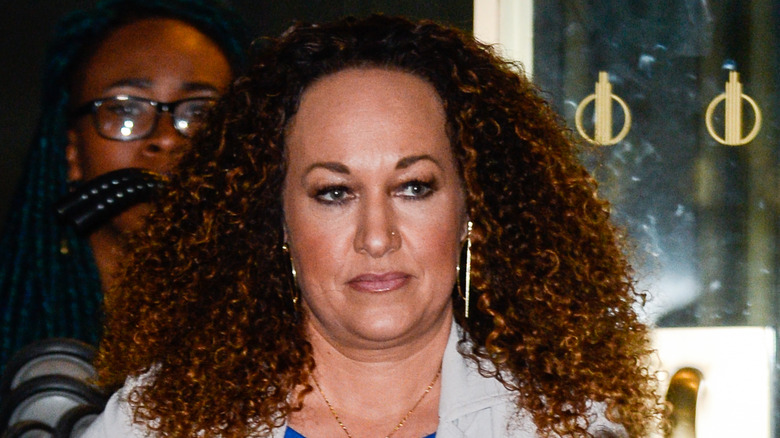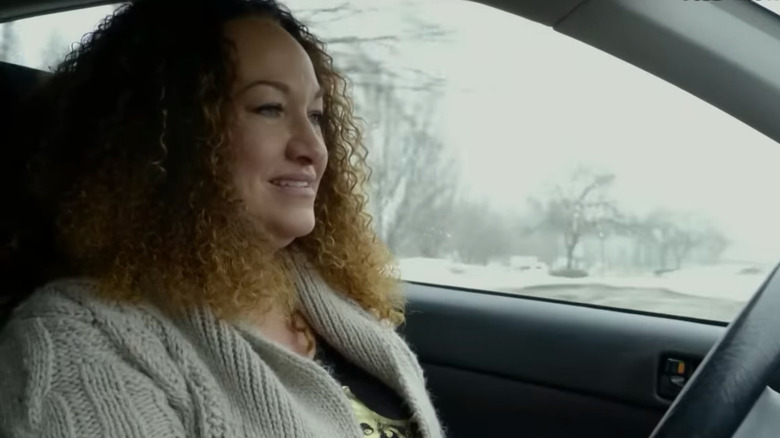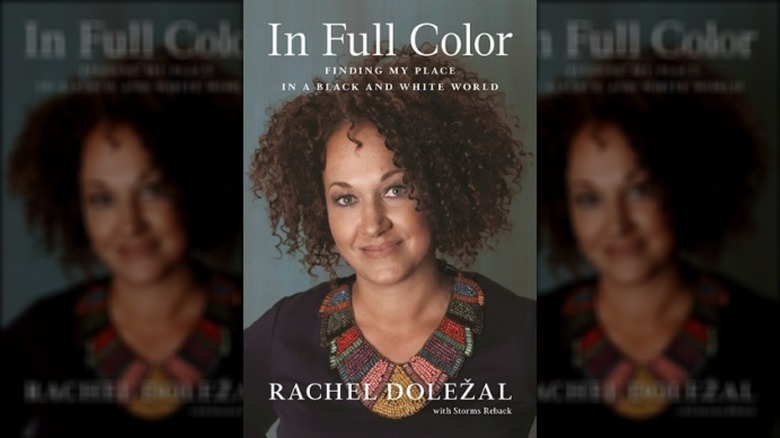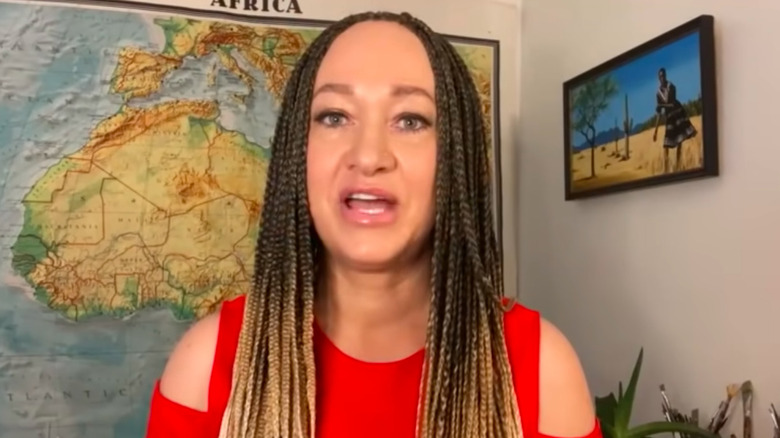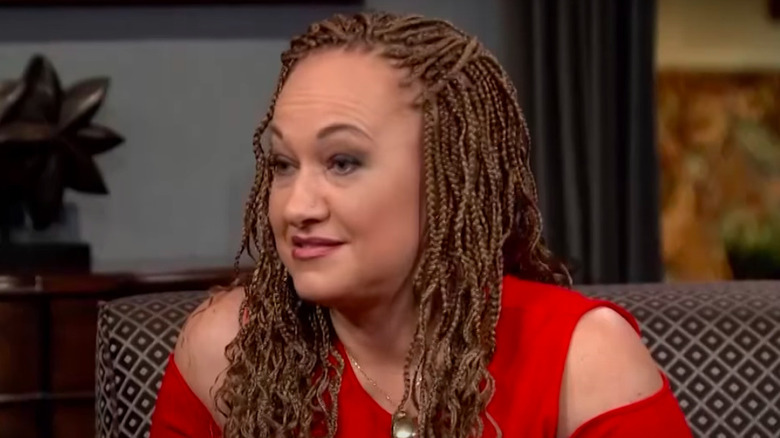Whatever Happened To Rachel Dolezal?
Thanks to the enormous impact of the Black Lives Matter movement, the 2010s was a decade when America was forced to confront ongoing racial discrimination in the wake of continuing police brutality against Black Americans. The effect of the movement is still felt today. But there are other race-related news stories that emerged during the decade that generated debate long before Black Lives Matter became a force for change. One of these was the shocking story of Rachel Dolezal, an African Studies instructor at Eastern Washington University who was also the president of the Spokane chapter of the NAACP. In 2015, it was revealed that Dolezal, who had represented herself as a Black woman with a Black father, was actually born to white parents — a fundamentalist Christian couple in rural Montana.
The truth of her identity came in a local news interview in which an interviewer asked a surprised Dolezal whether a Black man she had claimed was her dad was biologically related to her. Noticeably stumped, Dolezal pushes back against the question and then walks out of the interview after being asked whether her parents are white. The story baffled many who heard it, and Dolezal became fodder for countless comedy shows in the following months. But her lies also understandably provoked a wave of anger, particularly among African Americans, and she has remained a pariah of the community of which she was formerly a part.
She fought the backlash
When it was revealed that Rachel Dolezal's birth parents were white, her life immediately fell apart. Accused of being a "race faker," she lost her work at East Washington University and was forced to resign from the presidency of the Spokane NAACP. However, to the surprise of many, though Dolezal had been exposed and become a figure of much derision, she stood her ground and set about attempting to justify the behavior that so many deemed disingenuous and bizarre.
"How I feel is more powerful than how I was born," she told The Guardian. "I mean that not in the sense of having some easy way out. This has been a lifelong journey. This is not something that I cash in, cash out, change up, do at a convenience level or to freak people out or to make people happy. If somebody asked me how I identify, I identify as Black. Nothing about whiteness describes who I am." In a flurry of TV appearances and other interviews, Dolezal argued that she genuinely felt that she was Black and that what she did was a result of her being "transracial," which commentators saw as an attempt to parallel her actions with the transgender experience, which was gaining media attention in the 2010s.
Dolezal released a book and changed her name
Despite the anger and ridicule that the revelation of Rachel Dolezal's true ancestry provoked, the former equal rights campaigner argued that her seemingly bizarre behavior was justified. The greatest expression of Dolezal's attempt to establish a coherent defense of her misrepresentation of her race came in 2017 with the release of her book, "In Full Color: Finding My Place in a Black and White World." In it, she outlined her motives for adopting a Black identity and attempted to forward an argument for the existence of "transracialism." However, experts in the field such as Baz Dreisinger — who has written for the Washington Post and The Spokesman-Review — were not convinced by her arguments. According to Dreisinger, Dolezal's worldview is in fact informed by an especially blinkered form of white privilege.
Dolezal has never made steps to dial down her African American-inspired look, nor the use of African imagery in her writing or art. She holds a master's degree in art and continues to sell paintings of Black subjects and themes on her website. Shortly before she released her book, she officially changed her name to Nkechi Amare Diallo, a surname Spin noted she shares with a victim of police brutality whose death was covered in The New York Times in 1999.
She was charged with welfare fraud
It is no secret that Rachel Dolezal's life was upturned by the revelation that she had been masquerading as Black — so much so that she and her family were forced to subsist on food stamps, according to HuffPost. But the "transracial" controversy that destroyed her life wasn't the only part of her story that made her notorious. In 2018, KHQ reported that the former East Washington University instructor had been charged with welfare fraud after ailing to declare earnings related to her book.
Dolezal was accused of wrongfully claiming almost $9,000 in food assistance and child care from the Department of Social and Health Services in Spokane. According to the Associated Press (via Business Insider), at the time of the relief, she was receiving payments of more than $80,000, including large deposits from her publisher. Per the same source, Dolezal had reported only small monthly sums of around $300. Though Dolezal initially pleaded not guilty to the charges against her, she later agreed to pay back the funds she had wrongly received and to complete 120 hours of community service, The Spokesman-Review reported.
She now posts NSFW content
Despite being mired in notoriety for both the disingenuous representation of her race as well as the revelation of her welfare fraud, Rachel Dolezal has maintained an active online presence in the years since she first became a household name. However, she said on the "Tamron Hall Show" stated publicly that she has struggled to find typical work as a result of her infamy. As well as braiding hair and grant writing, Dolezal resorted to offering personalized videos on the platform Cameo for $37 a pop. As of January 2024, she was not offering videos.
In 2022, the controversial public figure made headlines once more when it was revealed she had started posting on the adult entertainment platform OnlyFans. Per Rolling Stone, she claimed to show "how my sensual side pairs with my creative spirit through intimate images inspired by color, light, and lingerie on the weekends." Per TMZ, Dolezal's agent has claimed that the disgraced former activist had been drawn to the platform to celebrate Rihanna's new range of lingerie. She is charging $9.99 a month for sign-ups.
